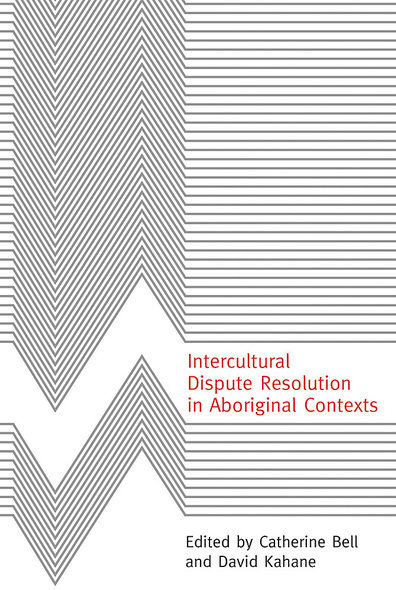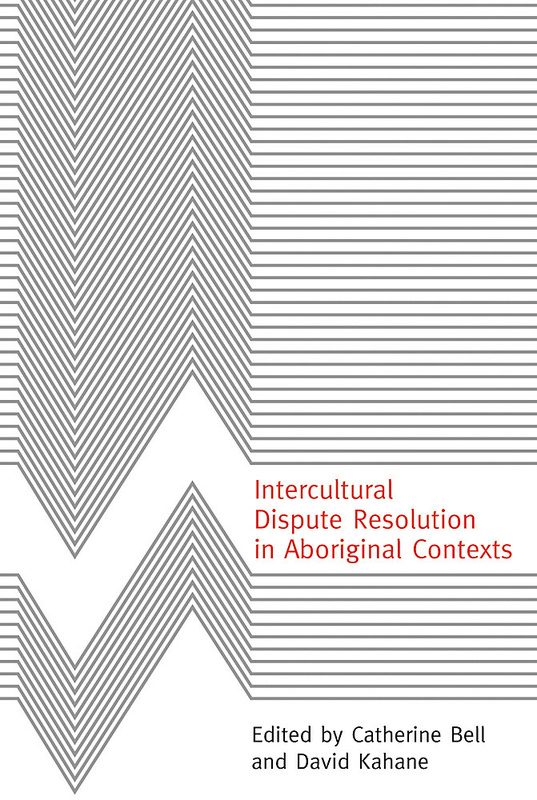
Intercultural Dispute Resolution in Aboriginal Contexts
In the last twenty years, there has been a growing interest in alternative dispute resolution (ADR), as scholars and practitioners seek more effective, context-sensitive approaches to conflict. Where formerly conflict was tackled and “resolved” in formal legal settings and with an adversarial spirit, more conciliatory approaches – negotiation, mediation, problem-solving, and arbitration – are now gaining favour. These new methods are proving especially appropriate in intercultural contexts, particularly for Aboriginal land claims, self-government, and community-based disputes.
The essays collected here by Catherine Bell and David Kahane provide a balanced view of ADR, exploring its opportunities and effectiveness alongside its challenges and limits. The essays are international in scope, with examples of efforts at dispute resolution involving Inuit and Arctic peoples, Dene, Gitxsan and Wet’suwet’en, Tsuu T’ina, Cree, Metis, Navajo, Maori, Aboriginal Australians, and Torres Strait Islanders.
With contributions from Aboriginal and non-Aboriginal theorists and practitioners, Intercultural Dispute Resolution in Aboriginal Contexts presents an array of insightful perspectives. This book will appeal to students and scholars of Aboriginal law and alternative dispute resolution; legal and political theorists; dispute resolution practitioners; and anyone involved in struggles around land claims, treaty, and self-government agreements in Canada or abroad.
Readers who are not directly involved in or interested to research either Alternative Dispute Resolution (ADR) or First Nations/Aboriginal issues, might be inclined to take no notice of this stellar volume edited by Catherine Bell and David Kahane. To ignore the volume would be a mistake for any scholar interested in conversations about multiculturalism, recognition, institution-building, democracy, liberalism, process design, and pluralism… I was pleased to find that this complex and thorough volume fulfilled each level of reading I might undertake. It avoids many of the problems often inherent to edited collections, and takes care as well to provide essays that are self-reflective and thoughtful about complex issues of generalization, voice, and neutrality. These essays work very well together, and the volume itself is coherent, enjoyable, and refreshing. I highly recommend it.
Bell and Kahane should be congratulated for bringing together such diverse views and voices. This is a significant and welcome collection that should grace the bookshelf of any serious conflict theorist attempting a level of competency in intercultural conflict, not only in the Aboriginal/non-Aboriginal context, but more generally.
Foreword / Paul Chartrand
Acknowledgments
Introduction / David Kahane and Catherine Bell
Part 1: Theoretical Perspectives
1 Learning New Dances: Finding Effective Ways to Address Intercultural Disputes / Michelle LeBaron
2 What is Culture? Generalizing About Aboriginal and Newcomer Perspectives / David Kahane
3 Perceiving the World Differently / Dale Turner
4 Paths to Intercultural Understanding: Feasting, Shared Horizons, and Unforced Consensus / Natalie Oman
5 Commentary: When Cultures Collide / Julie MacFarlane
Part 2: International Contexts
6 Navajo Peacemaking and Intercultural Dispute Resolution / Chief Justice Robert Yazzie
7 Cultural Conflict in Colonial Legal Systems: An Australian Perspective / Larissa Behrendt
8 The Waitangi Tribunal’s Role in the Dispute Resolution of Indigenous (Maori) Treaty Claims / Morris Te Whiti Love
9 Commentary: Indigenous Dispute Settlement, Self-Governance, and the Second Generation of Indigenous Rights / Jeremy Webber
Part 3: Canadian Contexts
10 Weche Teachings: Aboriginal Wisdom and Dispute Resolution / Elmer Ghostkeeper
11 Who Gets to Say What Happened? Reconciliation Issues for the Gitxsan / Val Napoleon
12 Reconciliation Devices: Using the Trust as an Interface Between Aboriginal and State Legal Orders / Richard Overstall
13 Parallel Justice Systems, or a Tale of Two Spiders / Dale Dewhurst
14 Commentary: Reconciling Our Memories in Order to Re-Envision Our Futures / N. Bruce Duthu
Part 4: Issues of Design and Implementation
15 Indigenous Dispute Resolution Systems Within Non-Indigenous Frameworks: Intercultural Dispute Resolution Initiatives in Canada / Catherine Bell
16 What’s Old is New Again: Aboriginal Dispute Resolution and the Civil Justice System / Diana Lowe and Jonathan H. Davidson
17 The Dispute Resolution Provisions of Three Northern Land Claims Agreements / Nigel Bankes
18 Commentary: Intercultural Dispute Resolution Initiatives Across Canada / Andrew Pirie
Conclusion
19 A Separate Peace: Strengthening Shared Justice / John Borrows
Contributors
Index





